新概念英语第一册Lesson103课件(共118张PPT)
文档属性
| 名称 | 新概念英语第一册Lesson103课件(共118张PPT) | 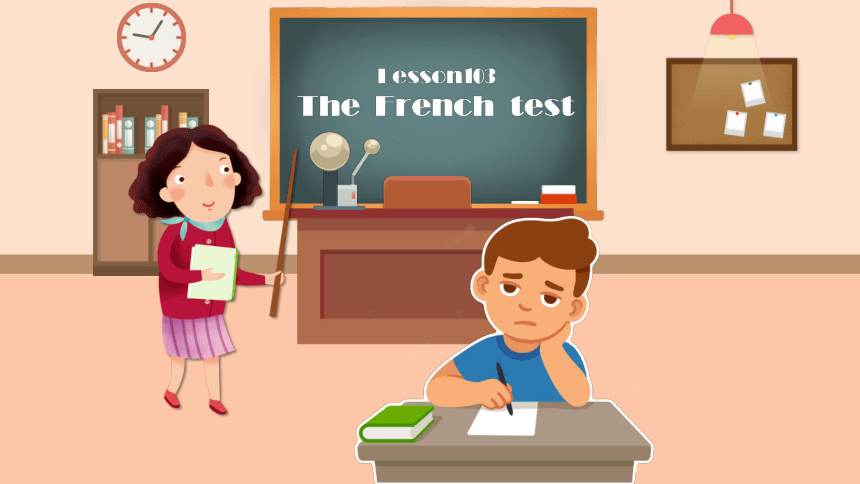 | |
| 格式 | pptx | ||
| 文件大小 | 109.8MB | ||
| 资源类型 | 教案 | ||
| 版本资源 | 新概念英语 | ||
| 科目 | 英语 | ||
| 更新时间 | 2023-10-29 14:02:49 | ||
图片预览

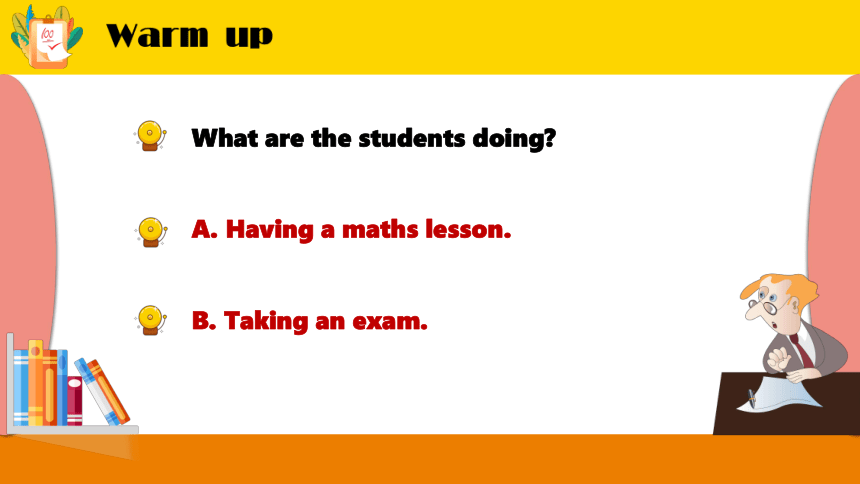
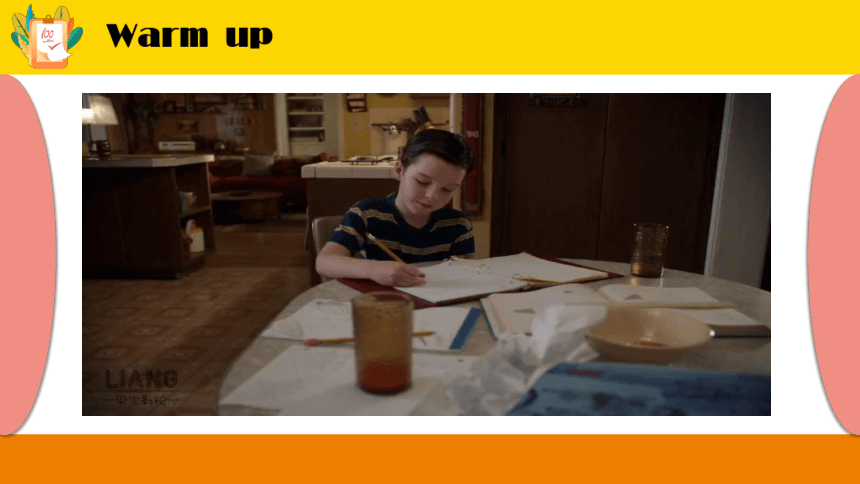
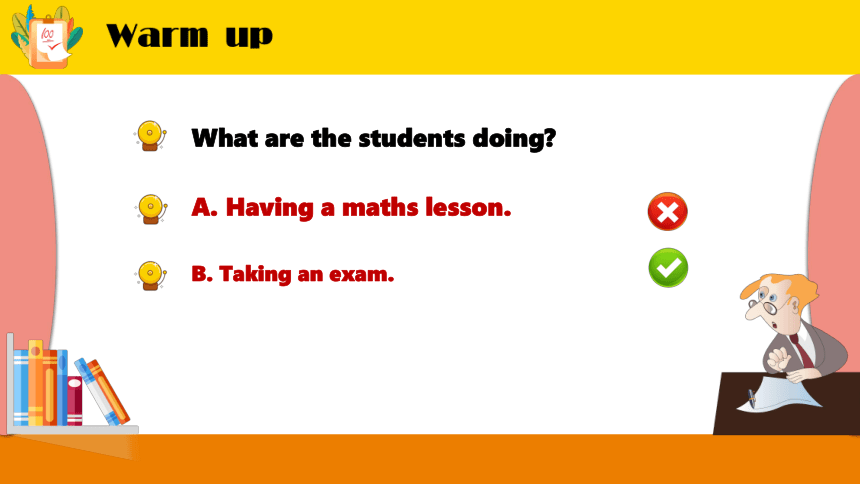
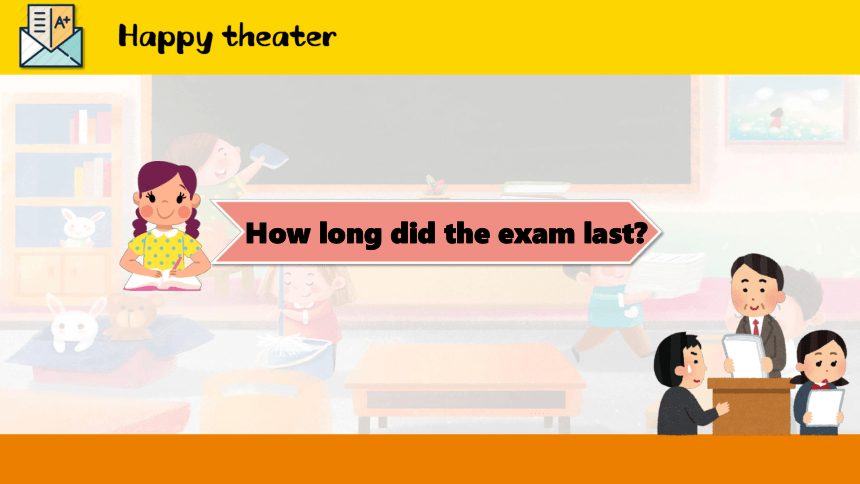
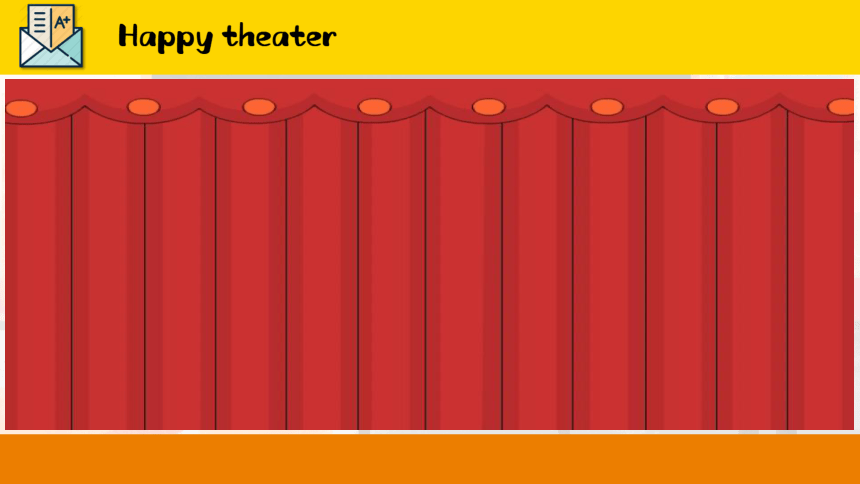
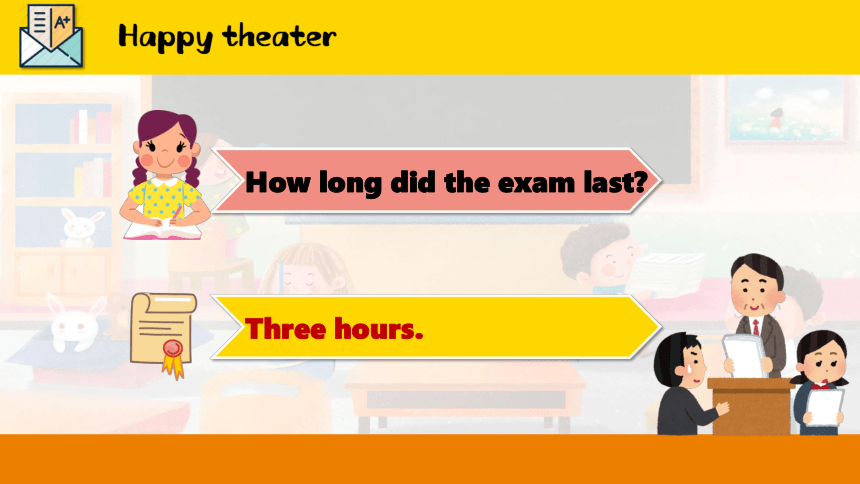
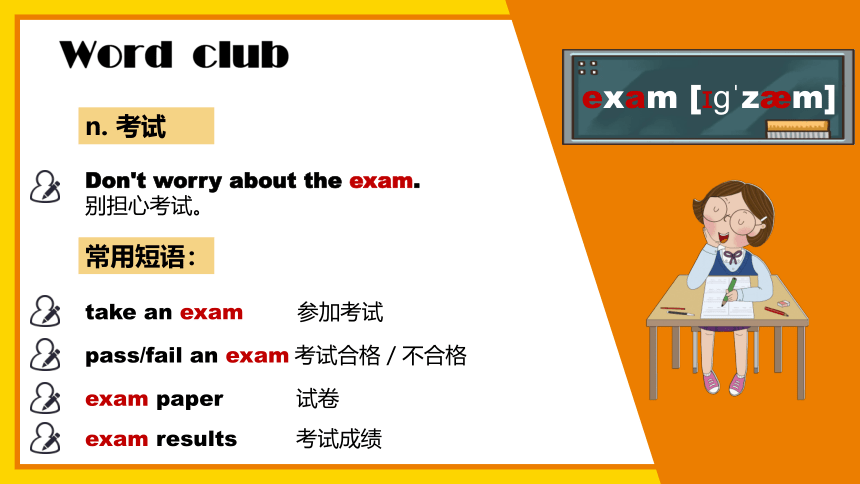
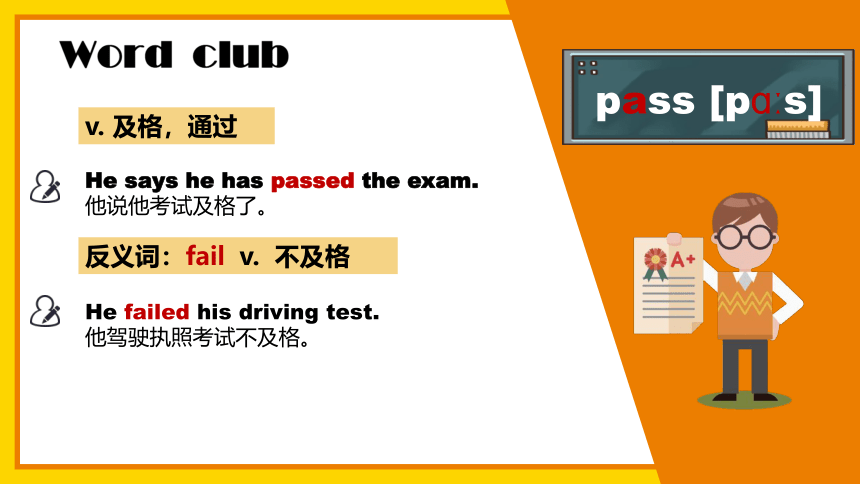
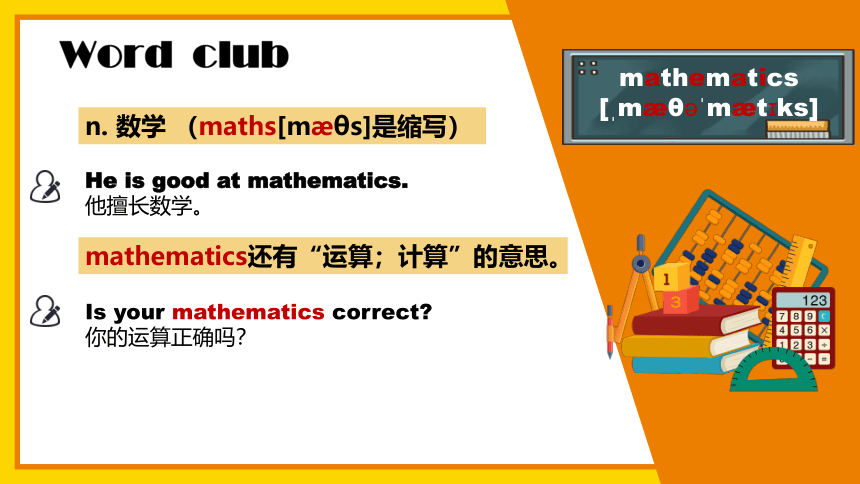
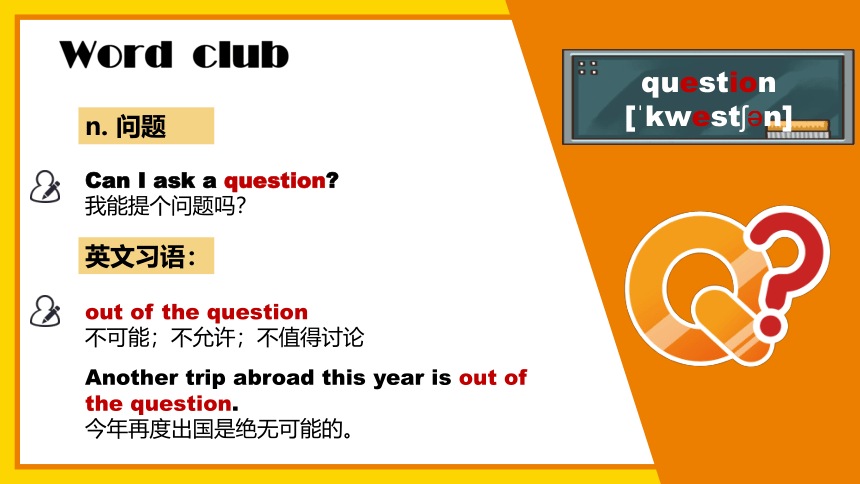
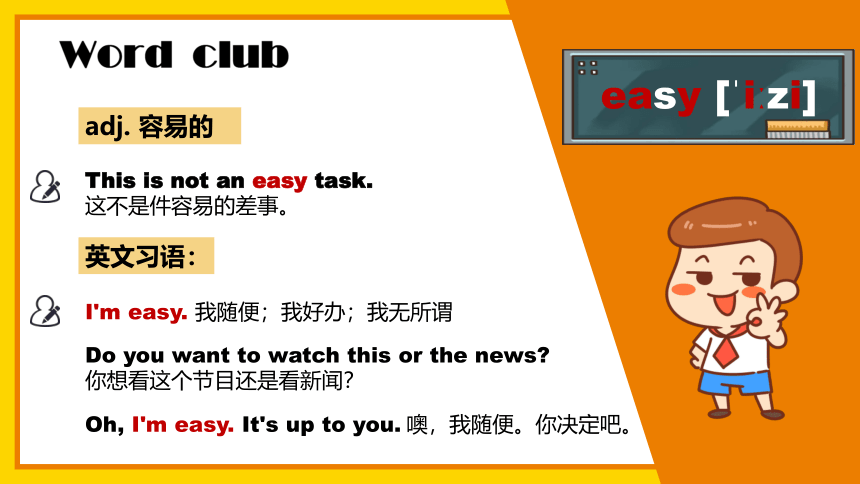
文档简介
(共118张PPT)
What are the students doing
A. Having a maths lesson.
B. Taking an exam.
What are the students doing
A. Having a maths lesson.
B. Taking an exam.
How long did the exam last
How long did the exam last
Three hours.
exam [ ɡ z m]
n. 考试
Don't worry about the exam.
别担心考试。
常用短语:
take an exam 参加考试
pass/fail an exam 考试合格 / 不合格
exam paper 试卷
exam results 考试成绩
pass [pɑ s]
v. 及格,通过
He says he has passed the exam.
他说他考试及格了。
反义词:fail v. 不及格
He failed his driving test.
他驾驶执照考试不及格。
mathematics [ m θ m t ks]
n. 数学 (maths[m θs]是缩写)
He is good at mathematics.
他擅长数学。
mathematics还有“运算;计算”的意思。
Is your mathematics correct
你的运算正确吗?
question [ kwest n]
n. 问题
Can I ask a question
我能提个问题吗?
英文习语:
out of the question
不可能;不允许;不值得讨论
Another trip abroad this year is out of the question.
今年再度出国是绝无可能的。
easy [ i zi]
adj. 容易的
This is not an easy task.
这不是件容易的差事。
英文习语:
I'm easy. 我随便;我好办;我无所谓
Do you want to watch this or the news
你想看这个节目还是看新闻?
Oh, I'm easy. It's up to you. 噢,我随便。你决定吧。
enough [ n f]
adv. 足够的
This house isn't big enough for us.
这房子对我们来说不够大。
enough作副词时,还可以表示“相当;十分”。
He seemed pleasant enough to me.
他对我似乎已相当和气了。
paper [ pe p ]
n. 考卷
The French paper was hard.
法语试卷难极了。
paper 常用于表示“纸张;报纸”等。
She wrote her name and address on a piece of paper.
她把姓名、地址写在一张纸上。
Have you seen today's paper
你看到今天的报纸没有?
fail [fe l]
v. 未及格,失败
She failed in English.
她英语不及格。
fail也可以作名词,表示“(考试)不及格”
I got three passes and one fail.
我考试三门及格,一门不及格。
answer [ ɑ ns ]
v. 回答
Come on, answer me! Where were you
快点,回答我!你到哪儿去了?
常用短语:
answer the question 回答问题
answer a letter 回信
answer the phone 接电话
answer the door 应门(铃)声开门
answer [ ɑ ns ]
answer还可以作名词,意为“答复;答案”。
I rang the bell, but there was no answer. 我按了门铃,但没有人应门。
Do you know the answer
你知道答案吗?
mark [mɑ k]
n. 分数
I got full marks in the maths test.
我在数学测验中得了个满分。
常用短语:
a high/low mark 高分 / 低分
pass mark 合格分
full marks 满分
rest [rest]
n. 其他的东西
The first question is hard, but the rest are easy.
第一个问题很难,但其余的都简单。
the rest of ... 剩余的...; 其余的......
I'm not doing this job for the rest of my life.
我不会一辈子干这种工作。
difficult [ d f k lt]
adj. 困难的
It's really difficult to read your writing.
你的笔迹真是难以辨认。
近义词:
hard adj. 困难的;难懂的
It's hard for old people to change their ways.老年人难以改变他们的习惯。
hate [he t]
v. 讨厌
I hate Monday mornings.
我讨厌星期一早晨。
hate sb. for sth./ doing sth. 憎恨某人(做某事)
I hated myself for feeling jealous.
我恨自己的嫉妒心。
low [l ]
adj. 低的
The sun is low in the sky.
太阳低挂在天空。
反义词:high adj. 高的
The house has a high wall all the way round it.
这栋房子的四周围着高墙。
cheer [t ]
v. 振作,振奋
We all cheered as the team came on to the field.
球队入场时我们都为之欢呼。
cheer up (使)变得更高兴,振奋起来
Give Mary a call,she needs cheering up. 给玛丽打个电话,她需要人安慰。
guy [ɡa ]
n. 家伙,人
At the end of the film the bad guy gets shot.
这坏蛋在影片结尾时被击毙。
guys 意为“伙计们;兄弟(或姐妹)们”。
Come on, you guys, let's get going!
快点,伙计们,咱们走吧!
top [t p]
n. 上方,顶部
She is standing at the top of the stairs. 她站在楼梯的顶端。
英文习语:
①from top to toe 从头到脚;浑身上下;全部
She was dressed in green from top to toe.
她从头到脚穿了一身绿。
top [t p]
英文习语:
②get on top of sth. 设法驾驭;处理
How will I ever get on top of all this work
我究竟怎样才处理得了这么多的工作?
读出单词,帮助Gary答考题!
top
guy
cheer
low
hate
读出单词,帮助Gary答考题!
difficult
rest
mark
answer
fail
读出单词,帮助Gary答考题!
paper
enough
easy
question
mathematics
读出单词,帮助Gary答考题!
pass
exam
GARY: How was the exam,Richard
RICHARD: Not too bad.I think I passed in English and Mathematics.
The questions were very easy. How about you, Gary
GARY: The English and Maths papersweren't easy enough for
me. I hope I haven't failed.
RICHARD: I think I failed the French paper.I could answer
sixteen of the questions. They were very easy. But I
couldn't answer the rest. They were too difficult for me.
The French test
I think I passed in English and Mathematics.
我想我的数学和英语及格了。
本句是宾语从句,其中“I think (that)...”是主句,“I passed in English and Mathematics.”在句中作宾语。that在从句中不充当任何成分,可以省略。再如:
I think (that) you’d better take an umbrella with you.
我想你最好带把伞。
Lisa thinks that she needs a haircut. 丽莎想她需要理发了。
I think I passed in English and Mathematics.
我想我的数学和英语及格了。
本句中,pass意为“及格;通过”,如果说通过某一个考试,直接用动词pass;如果说通过某一科目,则用pass in。如:
You can pass the exam, can’t you
你能通过考试,是不是?
He didn't pass in French because the paper is too difficult .
他的法语考试没及格,因为试卷太难了。
GARY: How was the exam,Richard
RICHARD: Not too bad.I think I passed in English and Mathematics.
The questions were very easy. How about you, Gary
GARY: The English and Maths papersweren't easy enough for
me. I hope I haven't failed.
RICHARD: I think I failed the French paper.I could answer
sixteen of the questions. They were very easy. But I
couldn't answer the rest. They were too difficult for me.
The French test
How about you, Gary 加里,你怎么样?
How about... = What about... 意为“......怎么样?”,用于征求他人意见或询问情况,后接名词或动名词。如:
What about dinner at my place
到我家吃晚饭好不好?
How about going out with me tomorrow
明天和我一起出去怎么样?
GARY: How was the exam,Richard
RICHARD: Not too bad.I think I passed in English and Mathematics.
The questions were very easy. How about you, Gary
GARY: The English and Maths papersweren't easy enough for
me. I hope I haven't failed.
RICHARD: I think I failed the French paper.I could answer
sixteen of the questions. They were very easy. But I
couldn't answer the rest. They were too difficult for me.
The French test
The English and Maths papers weren’t easy enough for me.
英语和数学试题对我来说不那么容易。
the English and Maths papers 英语和数学试卷,paper这个词当“试卷”讲时,为可数名词。
Each one has got an English paper.
每个人都拿到了一份英语试卷。
She spent the evening marking exam papers.
她用一个晚上批阅试卷。
The English and Maths papers weren’t easy enough for me.
英语和数学试题对我来说不那么容易。
“形容词+ enough for sb.”表示“对某人来说足够...”。如:
Is it clear enough for you to read
这个你读起来清不清楚?
The clothes cupboard is big enough for you to walk in.
这衣柜大得可容你进去。
GARY: How was the exam,Richard
RICHARD: Not too bad.I think I passed in English and Mathematics.
The questions were very easy. How about you, Gary
GARY: The English and Maths papersweren't easy enough for
me. I hope I haven't failed.
RICHARD: I think I failed the French paper.I could answer
sixteen of the questions. They were very easy. But I
couldn't answer the rest. They were too difficult for me.
The French test
I hope I haven’t failed.
我希望别不及格。
本句是“I hope (that) ...”结构的宾语从句,表示“希望,期望(某事发生)”。宾语从句中,如果主句是一般现在,从句可用任何所需要的时态。
I hope that it will be sunny this Saturday.
我希望这个周六是晴天。
She hopes that you have found the key.
她希望你已经找到那把钥匙了。
I hope I haven’t failed.
我希望别不及格。
fail意为“不及格;失败”,是pass的反义词。 fail to do sth. 表示“未能(做)......”。
She failed in English.
她英语不及格。
He failed to keep the appointment.
他未履约。
GARY: French tests are awful, aren't they
RICHARD:I hate them.I'm sure I've got a low mark.
GARY: Oh,cheer up!Perhaps we didn't do too badly. The guy next
to me wrote his name at the top of the paper.
RICHARD:Yes
GARY: Then he sat there and looked at it for three hours!He
didn't write a word!
The French test
French tests are awful, aren’t they
法语考试太可怕了,你说呢?
这是英语中的反意疑问句,它是由两部分组成,逗号前是一个陈述句,逗号之后是一个简略问句。如果前面一部分陈述句是肯定形式,简略问句就要用否定形式;如果前一部分是否定形式,后一部分则用肯定形式。
Your parents are in good health, aren't they
二老的身体都很健康,是不是?
She doesn't work here, does she
她不在此地工作,对吧?
GARY: French tests are awful, aren't they
RICHARD:I hate them.I'm sure I've got a low mark.
GARY: Oh,cheer up!Perhaps we didn't do too badly. The guy next
to me wrote his name at the top of the paper.
RICHARD:Yes
GARY: Then he sat there and looked at it for three hours!He
didn't write a word!
The French test
I hate them.
我讨厌法语考试。
这里的them代指上文所提到的“french tests”。
I hate to trouble you, but could I use your phone
我不愿麻烦你,但我能用一下你的电话吗?
(2)hate意为“憎恨;厌恶”,其用法如下:
①hate to do sth. 讨厌做某事(一次性的动作)
I hate them.
我讨厌法语考试。
She hates making mistakes.
她讨厌出错。
(2)hate意为“憎恨;厌恶”,其用法如下:
②hate doing sth. 讨厌做某事(经常性的动作)
GARY: French tests are awful, aren't they
RICHARD:I hate them.I'm sure I've got a low mark.
GARY: Oh,cheer up!Perhaps we didn't do too badly. The guy next
to me wrote his name at the top of the paper.
RICHARD:Yes
GARY: Then he sat there and looked at it for three hours!He
didn't write a word!
The French test
Oh, cheer up!
啊,别灰心!
cheer up 意为“使...高兴/ 振奋起来”,可以接sb. / oneself作宾语,也可独立使用。
You need a holiday to cheer you up.
你得去度个假,振作振作精神。
I wrote that song just to cheer myself up. 我写那首歌是给我自己打气的。
Cheer up, better times may be ahead.
打起精神来,好日子也许还在后头呢。
GARY: French tests are awful, aren't they
RICHARD:I hate them.I'm sure I've got a low mark.
GARY: Oh,cheer up!Perhaps we didn't do too badly. The guy next
to me wrote his name at the top of the paper.
RICHARD:Yes
GARY: Then he sat there and looked at it for three hours!He
didn't write a word!
The French test
The guy next to me wrote his name at the top of the paper. 坐在我旁边的那个人只在试卷顶端写了自己的名字。
next to... 表示“紧邻;在......旁边”。
We sat next to each other.
我们紧挨着坐在一起。
Our house is the one next to the school.
我家的房子就是学校旁边的那座。
The guy next to me wrote his name at the top of the paper. 坐在我旁边的那个人只在试卷顶端写了自己的名字。
at the top of ... 意为“在......顶部;在...最高处”。
The title is right at the top of the page. 标题就在页面的顶端。
'Stephen!' shouted Marcia at the top of her voice.
“斯蒂芬!”马西娅放声大喊。
Would you like to dub for the story Please prepare with your partners.
Read and dub
Read and dub
Read and retell
______ was the ______, Richard
Not too _____. I think I ________ English and Mathematics. The ___________ were very easy.
How
bad
passed in
questions
exam
Read and retell
________________ you, Gary
The English and Maths _______ weren’t easy _________ for me. I _______ I haven’t _________.
How about
enough
hope
failed
papers
Read and retell
I _______ I failed the ________________. I could _______ sixteen of the questions. They were very _____. But I couldn’t answer __________. They were ________________ for me.
think
answer
easy
the rest
French paper
too difficult
Read and retell
French tests are _______, _________they
I _______ them. I’m _______ I’ve got a _____________.
awful
hate
sure
low mark
aren’t
Read and retell
Oh, ___________! ___________ we didn’t do too _______. The guy __________me ________ his name _______________ the paper.
cheer up
badly
next to
wrote
Perhaps
at the top of
Read and retell
Yes
Then he _____ there and ___________ it ______ three hours! He didn’t _______ a word!
sat
for
write
looked at
clever [ klev ]
adj. 聪明的
stupid [ stju p d]
adj. 笨的
cheap [t i p]
adj. 便宜的
expensive [ k spens v] adj. 贵的
fresh [fre ] adj. 新鲜的
stale [ste l]
adj. 不新鲜的,变味的
low [l ]
adj. 低的,矮的
loud [la d] adj. 大声的
high [ha ] adj. 高的
hard [hɑ d] adj. 硬的
sweet [swi t] adj. 甜的
soft [s ft] adj. 软的
sour [ sa ] adj. 酸的
s
o
u
r
sour
帮助Gary拼写出试卷上的单词!
s
o
f
t
soft
帮助Gary拼写出试卷上的单词!
s
w
e
e
sweet
帮助Gary拼写出试卷上的单词!
t
h
a
r
d
hard
帮助Gary拼写出试卷上的单词!
h
i
g
h
high
帮助Gary拼写出试卷上的单词!
l
o
u
d
loud
帮助Gary拼写出试卷上的单词!
l
o
w
low
帮助Gary拼写出试卷上的单词!
s
t
a
l
stale
帮助Gary拼写出试卷上的单词!
e
f
r
e
s
fresh
帮助Gary拼写出试卷上的单词!
h
c
h
e
a
cheap
帮助Gary拼写出试卷上的单词!
p
s
t
u
p
stupid
帮助Gary拼写出试卷上的单词!
i
d
c
l
e
v
clever
帮助Gary拼写出试卷上的单词!
e
r
e
x
p
e
expensive
帮助Gary拼写出试卷上的单词!
n
s
i
v
e
Please listen to the audio and answer the questions according to the pictures.
Let’s listen
Let’s listen
Could he answer all the questions
Yes, he could.
They were easy enough for him to answer.
Let’s listen
Could he answer all the questions
No, he couldn’t.
They were too difficult for him to answer.
Let’s listen
Could he answer all the questions
Yes, he could.
He was clever enough to answer them.
Let’s listen
Could he answer all the questions
No, he couldn’t.
He was too stupid to answer.
Let’s listen
Could he buy the car
Yes, he could.
It was cheap enough for him to buy .
Let’s listen
Could he buy the car
No, he couldn’t.
It was too expensive for him to buy.
Let’s listen
Could they eat the cakes
Yes, they could.
They were sweet enough for them to eat .
Let’s listen
Could they eat the cakes
No, he couldn’t.
They were too stale for them to eat .
Please make dialogues for the pictures with your partners.
Let’s speak
Could they hear the stereo
Yes, they could.
It was loud enough for them to hear .
Let’s speak
Could they hear the stereo
No, they couldn’t.
It was too low for them to hear .
Let’s speak
Could he climb the wall
Yes, he could.
It was low enough for him to climb .
Let’s speak
Could he climb the wall
No, he couldn’t.
It was too high for him to climb .
Let’s speak
Could she eat the pear
Yes, she could.
It was soft enough for her to eat .
Let’s speak
Could she eat the pear
No, she couldn’t.
It was too hard for her to eat .
Let’s speak
Could she eat the orange
Yes, she could.
It was sweet enough for her to eat .
Let’s speak
Could she eat the pear
No, she couldn’t.
It was too sour for her to eat .
Let’s speak
英语考试结束了,有些人通过了考试,有些人却挂科了?请你根据以下信息,介绍以下同学们的考试情况吧!
Let’s write
Let’s write
The English exam was over. Some students passed the exam but the others failed.Tony and Lisa got high marks . They said that the questions are easy enough for them to answer. But Ben failed the exam. The questions are too difficult for him. He said he needed to study harder.
1.Tony和Lisa通过了考试,他们说......
2.Ben考试没有及格,他说......
enough的用法——
①在形容词之后使用:
enough, too和very
He failed the exam because it wasn’t easy enough.
他考试不及格,因为题不够容易。
enough的用法——
②在名词之前使用:
He didn’t buy the car because he didn’t have enough money.
他没有买那部车,因为他没有足够的钱。
enough的用法——
③用在enough... for sb./ sth. 和enough...to do sth.结构中 :
enough, too和very
This dress isn’t big enough for her.
这件裙子对她来说不够大。
She’s not old enough to live alone.
她未到独自生活的年纪。
too的用法——
①too表示“过于”:
enough, too和very
I can’t go out. It’s too hot.
我无法外出,太热了。
She couldn’t answer the questions because they were too difficult for her.
她无法回答这些问题,因为对她来说太难了。
too的用法——
②用在too... for sb./ sth.结构中:
enough, too和very
These shoes are too big for me.
我穿这双鞋太大了。
This wine is too sweet for me.
这种葡萄酒对我来说太甜了。
too的用法——
③用在too... to do sth.结构中:
enough, too和very
The box is too heavy for you to carry.
这个盒子太沉了,你没法扛起来。
It’s too far to walk home from here.
从这儿步行回家太远了。
very的用法——
①very作副词时,置于形容词、副词和限定词前,表示“很,非常,十分”
enough, too和very
I am very hungry.
我很饿。
You played very well.
你演得很好。
very的用法——
②very作形容词时,表示“正是的,恰好的,同一的”,在名词前作定语。
enough, too和very
That's the very thing I need.
那正是我需要的东西。
Those were her very words.
这些都是她的原话。
1.Is that suitcase light ______ for you to carry
2.The soup is _____ hot for me to drink.
3.She isn’t tall ______ to clean the top of the shelf.
4.Jack is doing ______ well at school.
5.I was lucky_______ to win the prize.
6.The car is ______ expensive, but I really like it ______ much.
enough
<1> 用too, enough或 very填空。
enough
very
enough
very
very
too
1.这橘子太酸了,我吃不了。(翻译句子)
The orange is _______ _______ for me ______ eat.
2.我真是够笨的,数学考了这么点分。(翻译句子)
I was ________ _________ to get such a _______ mark in maths.
3.The exam is not too bad. (对划线部分提问)
_________________________________________
too
<2> 按要求完成下列句子。
to
stupid
enough
low
How is the exam
sour
4.His voice is very low. We can’t hear it clearly. (合并为一句)
___________________________________________________
5.boy, clever, answer, the, questions, all, enough,is, it, to the(连词成句)
______________________________________________________________.
<2> 按要求完成下列句子。
His voice is too low for us to hear it clearly.
The boy is clever enough to answer all the questions.
美国大学的成绩是如何划分的?
美国大学成绩划分制度与中国有点相似,但是计算方法会有所区别,国内采用的是百分制算法,然而,美国采用的是GPA计算方法,那么,美国大学成绩等级是如何划分
美国大学多采用四分GPA制,分为五个等级,一般来说,A是总分的90%及以上,属于优秀等级,B是达到80%,属于良,C是达到总分的70%,也就是及格成绩,D是达到60%,属于待及格,其实已经算是挂科了,F只有60%以下,是不及格的成绩,那就fail掉喽!
下面我们一起看看天才儿童Sheldon得到B+的反应吧!
What are the students doing
A. Having a maths lesson.
B. Taking an exam.
What are the students doing
A. Having a maths lesson.
B. Taking an exam.
How long did the exam last
How long did the exam last
Three hours.
exam [ ɡ z m]
n. 考试
Don't worry about the exam.
别担心考试。
常用短语:
take an exam 参加考试
pass/fail an exam 考试合格 / 不合格
exam paper 试卷
exam results 考试成绩
pass [pɑ s]
v. 及格,通过
He says he has passed the exam.
他说他考试及格了。
反义词:fail v. 不及格
He failed his driving test.
他驾驶执照考试不及格。
mathematics [ m θ m t ks]
n. 数学 (maths[m θs]是缩写)
He is good at mathematics.
他擅长数学。
mathematics还有“运算;计算”的意思。
Is your mathematics correct
你的运算正确吗?
question [ kwest n]
n. 问题
Can I ask a question
我能提个问题吗?
英文习语:
out of the question
不可能;不允许;不值得讨论
Another trip abroad this year is out of the question.
今年再度出国是绝无可能的。
easy [ i zi]
adj. 容易的
This is not an easy task.
这不是件容易的差事。
英文习语:
I'm easy. 我随便;我好办;我无所谓
Do you want to watch this or the news
你想看这个节目还是看新闻?
Oh, I'm easy. It's up to you. 噢,我随便。你决定吧。
enough [ n f]
adv. 足够的
This house isn't big enough for us.
这房子对我们来说不够大。
enough作副词时,还可以表示“相当;十分”。
He seemed pleasant enough to me.
他对我似乎已相当和气了。
paper [ pe p ]
n. 考卷
The French paper was hard.
法语试卷难极了。
paper 常用于表示“纸张;报纸”等。
She wrote her name and address on a piece of paper.
她把姓名、地址写在一张纸上。
Have you seen today's paper
你看到今天的报纸没有?
fail [fe l]
v. 未及格,失败
She failed in English.
她英语不及格。
fail也可以作名词,表示“(考试)不及格”
I got three passes and one fail.
我考试三门及格,一门不及格。
answer [ ɑ ns ]
v. 回答
Come on, answer me! Where were you
快点,回答我!你到哪儿去了?
常用短语:
answer the question 回答问题
answer a letter 回信
answer the phone 接电话
answer the door 应门(铃)声开门
answer [ ɑ ns ]
answer还可以作名词,意为“答复;答案”。
I rang the bell, but there was no answer. 我按了门铃,但没有人应门。
Do you know the answer
你知道答案吗?
mark [mɑ k]
n. 分数
I got full marks in the maths test.
我在数学测验中得了个满分。
常用短语:
a high/low mark 高分 / 低分
pass mark 合格分
full marks 满分
rest [rest]
n. 其他的东西
The first question is hard, but the rest are easy.
第一个问题很难,但其余的都简单。
the rest of ... 剩余的...; 其余的......
I'm not doing this job for the rest of my life.
我不会一辈子干这种工作。
difficult [ d f k lt]
adj. 困难的
It's really difficult to read your writing.
你的笔迹真是难以辨认。
近义词:
hard adj. 困难的;难懂的
It's hard for old people to change their ways.老年人难以改变他们的习惯。
hate [he t]
v. 讨厌
I hate Monday mornings.
我讨厌星期一早晨。
hate sb. for sth./ doing sth. 憎恨某人(做某事)
I hated myself for feeling jealous.
我恨自己的嫉妒心。
low [l ]
adj. 低的
The sun is low in the sky.
太阳低挂在天空。
反义词:high adj. 高的
The house has a high wall all the way round it.
这栋房子的四周围着高墙。
cheer [t ]
v. 振作,振奋
We all cheered as the team came on to the field.
球队入场时我们都为之欢呼。
cheer up (使)变得更高兴,振奋起来
Give Mary a call,she needs cheering up. 给玛丽打个电话,她需要人安慰。
guy [ɡa ]
n. 家伙,人
At the end of the film the bad guy gets shot.
这坏蛋在影片结尾时被击毙。
guys 意为“伙计们;兄弟(或姐妹)们”。
Come on, you guys, let's get going!
快点,伙计们,咱们走吧!
top [t p]
n. 上方,顶部
She is standing at the top of the stairs. 她站在楼梯的顶端。
英文习语:
①from top to toe 从头到脚;浑身上下;全部
She was dressed in green from top to toe.
她从头到脚穿了一身绿。
top [t p]
英文习语:
②get on top of sth. 设法驾驭;处理
How will I ever get on top of all this work
我究竟怎样才处理得了这么多的工作?
读出单词,帮助Gary答考题!
top
guy
cheer
low
hate
读出单词,帮助Gary答考题!
difficult
rest
mark
answer
fail
读出单词,帮助Gary答考题!
paper
enough
easy
question
mathematics
读出单词,帮助Gary答考题!
pass
exam
GARY: How was the exam,Richard
RICHARD: Not too bad.I think I passed in English and Mathematics.
The questions were very easy. How about you, Gary
GARY: The English and Maths papersweren't easy enough for
me. I hope I haven't failed.
RICHARD: I think I failed the French paper.I could answer
sixteen of the questions. They were very easy. But I
couldn't answer the rest. They were too difficult for me.
The French test
I think I passed in English and Mathematics.
我想我的数学和英语及格了。
本句是宾语从句,其中“I think (that)...”是主句,“I passed in English and Mathematics.”在句中作宾语。that在从句中不充当任何成分,可以省略。再如:
I think (that) you’d better take an umbrella with you.
我想你最好带把伞。
Lisa thinks that she needs a haircut. 丽莎想她需要理发了。
I think I passed in English and Mathematics.
我想我的数学和英语及格了。
本句中,pass意为“及格;通过”,如果说通过某一个考试,直接用动词pass;如果说通过某一科目,则用pass in。如:
You can pass the exam, can’t you
你能通过考试,是不是?
He didn't pass in French because the paper is too difficult .
他的法语考试没及格,因为试卷太难了。
GARY: How was the exam,Richard
RICHARD: Not too bad.I think I passed in English and Mathematics.
The questions were very easy. How about you, Gary
GARY: The English and Maths papersweren't easy enough for
me. I hope I haven't failed.
RICHARD: I think I failed the French paper.I could answer
sixteen of the questions. They were very easy. But I
couldn't answer the rest. They were too difficult for me.
The French test
How about you, Gary 加里,你怎么样?
How about... = What about... 意为“......怎么样?”,用于征求他人意见或询问情况,后接名词或动名词。如:
What about dinner at my place
到我家吃晚饭好不好?
How about going out with me tomorrow
明天和我一起出去怎么样?
GARY: How was the exam,Richard
RICHARD: Not too bad.I think I passed in English and Mathematics.
The questions were very easy. How about you, Gary
GARY: The English and Maths papersweren't easy enough for
me. I hope I haven't failed.
RICHARD: I think I failed the French paper.I could answer
sixteen of the questions. They were very easy. But I
couldn't answer the rest. They were too difficult for me.
The French test
The English and Maths papers weren’t easy enough for me.
英语和数学试题对我来说不那么容易。
the English and Maths papers 英语和数学试卷,paper这个词当“试卷”讲时,为可数名词。
Each one has got an English paper.
每个人都拿到了一份英语试卷。
She spent the evening marking exam papers.
她用一个晚上批阅试卷。
The English and Maths papers weren’t easy enough for me.
英语和数学试题对我来说不那么容易。
“形容词+ enough for sb.”表示“对某人来说足够...”。如:
Is it clear enough for you to read
这个你读起来清不清楚?
The clothes cupboard is big enough for you to walk in.
这衣柜大得可容你进去。
GARY: How was the exam,Richard
RICHARD: Not too bad.I think I passed in English and Mathematics.
The questions were very easy. How about you, Gary
GARY: The English and Maths papersweren't easy enough for
me. I hope I haven't failed.
RICHARD: I think I failed the French paper.I could answer
sixteen of the questions. They were very easy. But I
couldn't answer the rest. They were too difficult for me.
The French test
I hope I haven’t failed.
我希望别不及格。
本句是“I hope (that) ...”结构的宾语从句,表示“希望,期望(某事发生)”。宾语从句中,如果主句是一般现在,从句可用任何所需要的时态。
I hope that it will be sunny this Saturday.
我希望这个周六是晴天。
She hopes that you have found the key.
她希望你已经找到那把钥匙了。
I hope I haven’t failed.
我希望别不及格。
fail意为“不及格;失败”,是pass的反义词。 fail to do sth. 表示“未能(做)......”。
She failed in English.
她英语不及格。
He failed to keep the appointment.
他未履约。
GARY: French tests are awful, aren't they
RICHARD:I hate them.I'm sure I've got a low mark.
GARY: Oh,cheer up!Perhaps we didn't do too badly. The guy next
to me wrote his name at the top of the paper.
RICHARD:Yes
GARY: Then he sat there and looked at it for three hours!He
didn't write a word!
The French test
French tests are awful, aren’t they
法语考试太可怕了,你说呢?
这是英语中的反意疑问句,它是由两部分组成,逗号前是一个陈述句,逗号之后是一个简略问句。如果前面一部分陈述句是肯定形式,简略问句就要用否定形式;如果前一部分是否定形式,后一部分则用肯定形式。
Your parents are in good health, aren't they
二老的身体都很健康,是不是?
She doesn't work here, does she
她不在此地工作,对吧?
GARY: French tests are awful, aren't they
RICHARD:I hate them.I'm sure I've got a low mark.
GARY: Oh,cheer up!Perhaps we didn't do too badly. The guy next
to me wrote his name at the top of the paper.
RICHARD:Yes
GARY: Then he sat there and looked at it for three hours!He
didn't write a word!
The French test
I hate them.
我讨厌法语考试。
这里的them代指上文所提到的“french tests”。
I hate to trouble you, but could I use your phone
我不愿麻烦你,但我能用一下你的电话吗?
(2)hate意为“憎恨;厌恶”,其用法如下:
①hate to do sth. 讨厌做某事(一次性的动作)
I hate them.
我讨厌法语考试。
She hates making mistakes.
她讨厌出错。
(2)hate意为“憎恨;厌恶”,其用法如下:
②hate doing sth. 讨厌做某事(经常性的动作)
GARY: French tests are awful, aren't they
RICHARD:I hate them.I'm sure I've got a low mark.
GARY: Oh,cheer up!Perhaps we didn't do too badly. The guy next
to me wrote his name at the top of the paper.
RICHARD:Yes
GARY: Then he sat there and looked at it for three hours!He
didn't write a word!
The French test
Oh, cheer up!
啊,别灰心!
cheer up 意为“使...高兴/ 振奋起来”,可以接sb. / oneself作宾语,也可独立使用。
You need a holiday to cheer you up.
你得去度个假,振作振作精神。
I wrote that song just to cheer myself up. 我写那首歌是给我自己打气的。
Cheer up, better times may be ahead.
打起精神来,好日子也许还在后头呢。
GARY: French tests are awful, aren't they
RICHARD:I hate them.I'm sure I've got a low mark.
GARY: Oh,cheer up!Perhaps we didn't do too badly. The guy next
to me wrote his name at the top of the paper.
RICHARD:Yes
GARY: Then he sat there and looked at it for three hours!He
didn't write a word!
The French test
The guy next to me wrote his name at the top of the paper. 坐在我旁边的那个人只在试卷顶端写了自己的名字。
next to... 表示“紧邻;在......旁边”。
We sat next to each other.
我们紧挨着坐在一起。
Our house is the one next to the school.
我家的房子就是学校旁边的那座。
The guy next to me wrote his name at the top of the paper. 坐在我旁边的那个人只在试卷顶端写了自己的名字。
at the top of ... 意为“在......顶部;在...最高处”。
The title is right at the top of the page. 标题就在页面的顶端。
'Stephen!' shouted Marcia at the top of her voice.
“斯蒂芬!”马西娅放声大喊。
Would you like to dub for the story Please prepare with your partners.
Read and dub
Read and dub
Read and retell
______ was the ______, Richard
Not too _____. I think I ________ English and Mathematics. The ___________ were very easy.
How
bad
passed in
questions
exam
Read and retell
________________ you, Gary
The English and Maths _______ weren’t easy _________ for me. I _______ I haven’t _________.
How about
enough
hope
failed
papers
Read and retell
I _______ I failed the ________________. I could _______ sixteen of the questions. They were very _____. But I couldn’t answer __________. They were ________________ for me.
think
answer
easy
the rest
French paper
too difficult
Read and retell
French tests are _______, _________they
I _______ them. I’m _______ I’ve got a _____________.
awful
hate
sure
low mark
aren’t
Read and retell
Oh, ___________! ___________ we didn’t do too _______. The guy __________me ________ his name _______________ the paper.
cheer up
badly
next to
wrote
Perhaps
at the top of
Read and retell
Yes
Then he _____ there and ___________ it ______ three hours! He didn’t _______ a word!
sat
for
write
looked at
clever [ klev ]
adj. 聪明的
stupid [ stju p d]
adj. 笨的
cheap [t i p]
adj. 便宜的
expensive [ k spens v] adj. 贵的
fresh [fre ] adj. 新鲜的
stale [ste l]
adj. 不新鲜的,变味的
low [l ]
adj. 低的,矮的
loud [la d] adj. 大声的
high [ha ] adj. 高的
hard [hɑ d] adj. 硬的
sweet [swi t] adj. 甜的
soft [s ft] adj. 软的
sour [ sa ] adj. 酸的
s
o
u
r
sour
帮助Gary拼写出试卷上的单词!
s
o
f
t
soft
帮助Gary拼写出试卷上的单词!
s
w
e
e
sweet
帮助Gary拼写出试卷上的单词!
t
h
a
r
d
hard
帮助Gary拼写出试卷上的单词!
h
i
g
h
high
帮助Gary拼写出试卷上的单词!
l
o
u
d
loud
帮助Gary拼写出试卷上的单词!
l
o
w
low
帮助Gary拼写出试卷上的单词!
s
t
a
l
stale
帮助Gary拼写出试卷上的单词!
e
f
r
e
s
fresh
帮助Gary拼写出试卷上的单词!
h
c
h
e
a
cheap
帮助Gary拼写出试卷上的单词!
p
s
t
u
p
stupid
帮助Gary拼写出试卷上的单词!
i
d
c
l
e
v
clever
帮助Gary拼写出试卷上的单词!
e
r
e
x
p
e
expensive
帮助Gary拼写出试卷上的单词!
n
s
i
v
e
Please listen to the audio and answer the questions according to the pictures.
Let’s listen
Let’s listen
Could he answer all the questions
Yes, he could.
They were easy enough for him to answer.
Let’s listen
Could he answer all the questions
No, he couldn’t.
They were too difficult for him to answer.
Let’s listen
Could he answer all the questions
Yes, he could.
He was clever enough to answer them.
Let’s listen
Could he answer all the questions
No, he couldn’t.
He was too stupid to answer.
Let’s listen
Could he buy the car
Yes, he could.
It was cheap enough for him to buy .
Let’s listen
Could he buy the car
No, he couldn’t.
It was too expensive for him to buy.
Let’s listen
Could they eat the cakes
Yes, they could.
They were sweet enough for them to eat .
Let’s listen
Could they eat the cakes
No, he couldn’t.
They were too stale for them to eat .
Please make dialogues for the pictures with your partners.
Let’s speak
Could they hear the stereo
Yes, they could.
It was loud enough for them to hear .
Let’s speak
Could they hear the stereo
No, they couldn’t.
It was too low for them to hear .
Let’s speak
Could he climb the wall
Yes, he could.
It was low enough for him to climb .
Let’s speak
Could he climb the wall
No, he couldn’t.
It was too high for him to climb .
Let’s speak
Could she eat the pear
Yes, she could.
It was soft enough for her to eat .
Let’s speak
Could she eat the pear
No, she couldn’t.
It was too hard for her to eat .
Let’s speak
Could she eat the orange
Yes, she could.
It was sweet enough for her to eat .
Let’s speak
Could she eat the pear
No, she couldn’t.
It was too sour for her to eat .
Let’s speak
英语考试结束了,有些人通过了考试,有些人却挂科了?请你根据以下信息,介绍以下同学们的考试情况吧!
Let’s write
Let’s write
The English exam was over. Some students passed the exam but the others failed.Tony and Lisa got high marks . They said that the questions are easy enough for them to answer. But Ben failed the exam. The questions are too difficult for him. He said he needed to study harder.
1.Tony和Lisa通过了考试,他们说......
2.Ben考试没有及格,他说......
enough的用法——
①在形容词之后使用:
enough, too和very
He failed the exam because it wasn’t easy enough.
他考试不及格,因为题不够容易。
enough的用法——
②在名词之前使用:
He didn’t buy the car because he didn’t have enough money.
他没有买那部车,因为他没有足够的钱。
enough的用法——
③用在enough... for sb./ sth. 和enough...to do sth.结构中 :
enough, too和very
This dress isn’t big enough for her.
这件裙子对她来说不够大。
She’s not old enough to live alone.
她未到独自生活的年纪。
too的用法——
①too表示“过于”:
enough, too和very
I can’t go out. It’s too hot.
我无法外出,太热了。
She couldn’t answer the questions because they were too difficult for her.
她无法回答这些问题,因为对她来说太难了。
too的用法——
②用在too... for sb./ sth.结构中:
enough, too和very
These shoes are too big for me.
我穿这双鞋太大了。
This wine is too sweet for me.
这种葡萄酒对我来说太甜了。
too的用法——
③用在too... to do sth.结构中:
enough, too和very
The box is too heavy for you to carry.
这个盒子太沉了,你没法扛起来。
It’s too far to walk home from here.
从这儿步行回家太远了。
very的用法——
①very作副词时,置于形容词、副词和限定词前,表示“很,非常,十分”
enough, too和very
I am very hungry.
我很饿。
You played very well.
你演得很好。
very的用法——
②very作形容词时,表示“正是的,恰好的,同一的”,在名词前作定语。
enough, too和very
That's the very thing I need.
那正是我需要的东西。
Those were her very words.
这些都是她的原话。
1.Is that suitcase light ______ for you to carry
2.The soup is _____ hot for me to drink.
3.She isn’t tall ______ to clean the top of the shelf.
4.Jack is doing ______ well at school.
5.I was lucky_______ to win the prize.
6.The car is ______ expensive, but I really like it ______ much.
enough
<1> 用too, enough或 very填空。
enough
very
enough
very
very
too
1.这橘子太酸了,我吃不了。(翻译句子)
The orange is _______ _______ for me ______ eat.
2.我真是够笨的,数学考了这么点分。(翻译句子)
I was ________ _________ to get such a _______ mark in maths.
3.The exam is not too bad. (对划线部分提问)
_________________________________________
too
<2> 按要求完成下列句子。
to
stupid
enough
low
How is the exam
sour
4.His voice is very low. We can’t hear it clearly. (合并为一句)
___________________________________________________
5.boy, clever, answer, the, questions, all, enough,is, it, to the(连词成句)
______________________________________________________________.
<2> 按要求完成下列句子。
His voice is too low for us to hear it clearly.
The boy is clever enough to answer all the questions.
美国大学的成绩是如何划分的?
美国大学成绩划分制度与中国有点相似,但是计算方法会有所区别,国内采用的是百分制算法,然而,美国采用的是GPA计算方法,那么,美国大学成绩等级是如何划分
美国大学多采用四分GPA制,分为五个等级,一般来说,A是总分的90%及以上,属于优秀等级,B是达到80%,属于良,C是达到总分的70%,也就是及格成绩,D是达到60%,属于待及格,其实已经算是挂科了,F只有60%以下,是不及格的成绩,那就fail掉喽!
下面我们一起看看天才儿童Sheldon得到B+的反应吧!
同课章节目录
